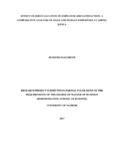| dc.description.abstract | The main aim of this study was to establish the effect of job evaluation on employee job satisfaction in Airtel Kenya. The objective of this study was investigate how job evaluation affect employee job satisfaction. This study adopted a descriptive research design and targeted employees of Airtel Kenya. A sample size of 125 respondents were selected for the study. Data was collected by use of a questionnaire that was administered to Airtel Kenya employees. The data was then analyzed by use of descriptive and inferential statistics. With regard to descriptive statistics, the results were interpreted and findings represented in tables and analyzed through percentages, mean scores, standard deviations and frequencies. On the other hand, results from inferential statistics were presented through regression and ANOVA models. The study found that job evaluation ensured that job classification is done according to functions, job evaluation ensured that staff are placed / deployed according to the requirements and skills. It also found that both male and female respondents feel satisfied when they accomplish their tasks, they like the competence of their supervisor in making decisions, they have good working relationship with their supervisor. The study concluded that job evaluation is an instrument in authoritative administration that has been used to enhance employees' job efficiency. Job evaluation ought to be done all the more oftentimes through benchmarking with comparable organizations in the business with going business sector rate to guarantee employees stay aggressive and reduce turnover of the employees. | en_US |



